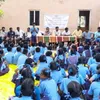Teacher’s Day: Here’s how teachers in rural India are striving to impart education online
This Teacher’s Day, let us take some time out to recognise the endeavours of teachers in rural India who are working hard to adapt to digital education to impart knowledge to students amid the COVID-19 pandemic.
Anju Ann Mathew

Saturday September 05, 2020 , 9 min Read
Vijaylakshmi Akki (37) wakes up at 5.30 am every day. She starts her day by cooking meals for her family and later spends time planning the day’s classes as well as brushing up on some of the lessons. Vijaylakshmi, who has been teaching at the Higher Primary Kannada Girls School in the quaint village of Magadi in Karnataka’s Gadag district, takes multiple sessions of 45 minutes each daily.
Once she returns home around 4 pm, she is exhausted. However, she makes sure to complete all the household chores by the end of the day.
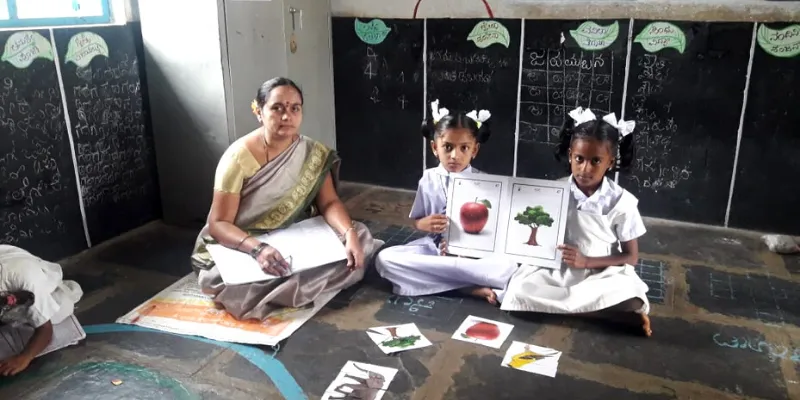
Vijaylakshmi Akki teaching children at the Higher Primary Kannada Girls School.
“Though it has been more than two decades since I joined the teaching profession, I still step into the classroom with a lot of enthusiasm. There is so much satisfaction that comes with imparting knowledge to children and moulding their thought processes,” Vijaylakshmi Akki tells SocialStory.
Teachers like Vijaylakshmi play one of the most significant roles in the lives of young minds. Not only do they dispel the clouds of ignorance from the minds of students, but also help them in becoming future leaders. Well, Teacher’s Day is commemorated on September 5 every year to appreciate and honour this reality.
However, the COVID-19 pandemic has created multiple hardships for teachers, especially for those in the rural areas of India. With most of the schools shutting operations due to the pandemic, school administrations are now relying on virtual platforms to conduct classes online. Nonetheless, there is a lack of tools to impart digital education in these remote regions.
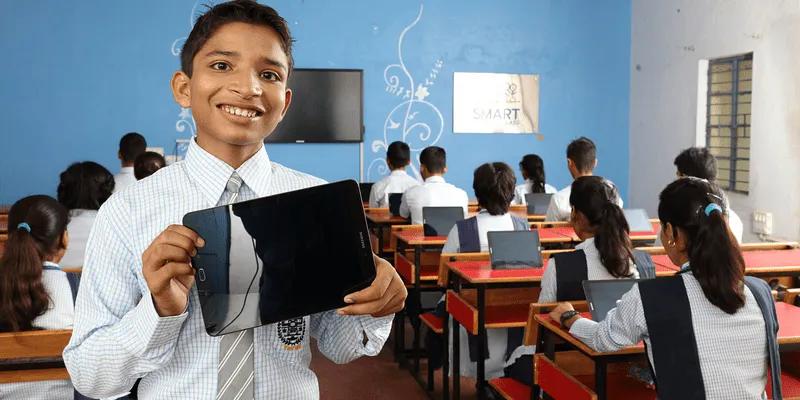
Many schools across India have shifted to digital education.
According to a report by the Central Statistics Office (CSO), India is home to around 43 crore children in the age-group of zero to 18 years with at least 74 percent of them residing in rural areas. Despite a large number of young ones living in pastoral lands, only four percent of them have access to computers or tablets, and a meagre 15 percent have internet connectivity.
In order to close this gap, teachers belonging to rural areas are working hard to overcome the challenges and ensure that children are not left out in the pursuit of basic education.
“I am not good with technology nor did I receive any training for it. There are quite a few stumbling blocks along the way – from monitoring children to inaccessibility to digital devices. But I am trying to leverage all sorts of platforms like WhatsApp, YouTube, and even SMS to keep the learning going for children,” she explains.
Fighting against odds
The education sector has witnessed major transformation over the last decade. The traditional classroom model is gradually metamorphosing into multimedia and virtual sessions. While these changes are visible in urban schools, the rural parts of the country are struggling with outdated teaching material, lack of training for teachers, and unavailability of appropriate digital tools.
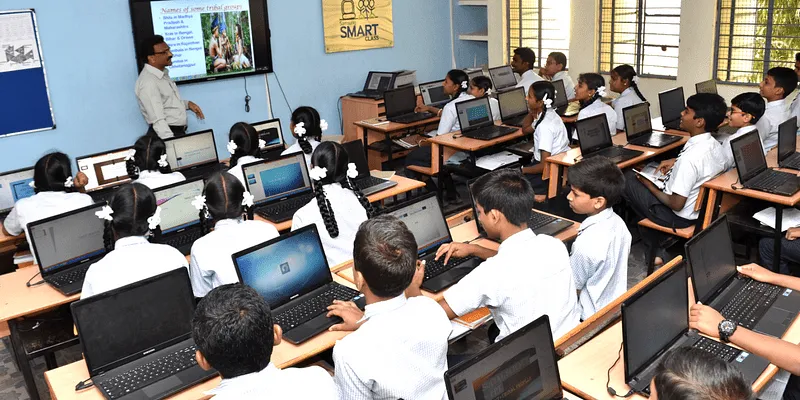
There is a huge gap in accessibility of digital tools between urban and rural schools.
With an objective to bridge these gaps and to aid teachers and students in adapting to the new normal, many organisations and individuals have been coming forward.
DigitalDaan is an online platform that is collecting old, yet functional digital devices like smartphones, laptops, tablets, and projectors. Through their 700 centres across 25 states and 130 districts in rural areas, they have been enabling students to get access to digital education.
While the obvious challenge of inaccessibility to digital devices exists, Osama Manzar, co-founder of the DigitalDaan initiative believes that the socio-behavioural changes of the online classrooms calls for a bigger challenge.
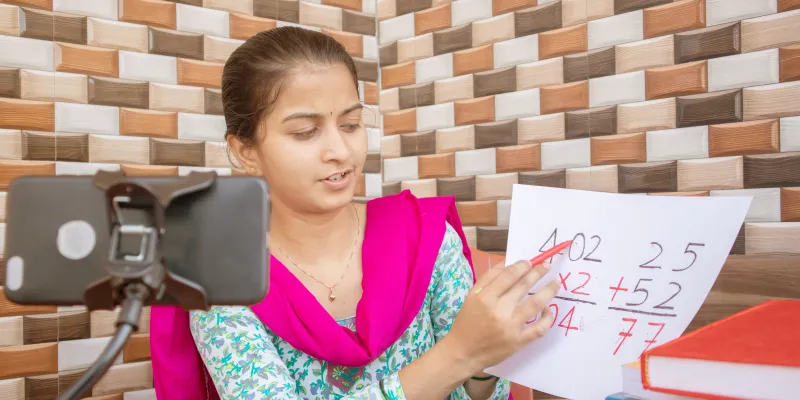
Teachers are putting their best foot forward to conduct online classes.
“The teachers who were used to working in a classroom environment are now faced with issues like conducting classes, taking assignments, and finding a method for assessment in the digital space. In addition, there is also a huge pressure on the student community to come to terms with these changes. While DigitalDaan is resolving a very small part of this problem, catering to millions of students across the country is a huge challenge,” he says.
Rajnikanth Sukhshyam Mendhe (35) has been teaching at the Zilla Parishad Primary School in Gorhe, a small village in Pune district of Maharashtra. Most of his students hail from economically-poor backgrounds and hence cannot afford smartphones or tablets.
“As soon as the government announced the lockdown in March this year, I started taking sessions online. But the response has not been very good. Only two to three children out of the 25 in my class have smartphones at home. Many of them do not have Wi-Fi connectivity nor can they afford to recharge their data packs,” Rajnikanth says.
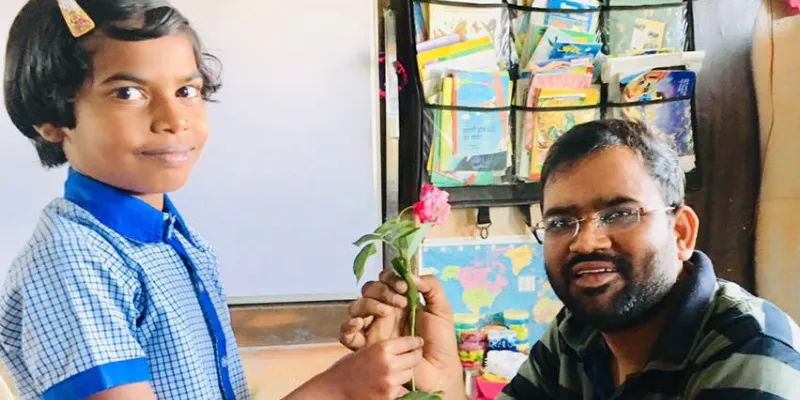
Rajnikanth has been recharging data packs for students who cannot afford them.
Rajnikanth is well-versed and comfortable in using apps and other digital platforms to put up content. Nevertheless, this is not the case with teachers who are aged. A large percentage of the teachers working in rural schools are more than 40 or 50 years old. Learning to use new technologies and understanding gadgetry by themselves is a difficult and time-consuming process.
Keeping the teaching spirit alive
Despite the hardships that have been weighing down on them, it is astonishing to see how some teachers are determined to fulfill their passion for teaching with support from non-governmental organisations, startups, and the government.
This can be observed through the jugaad setups (an innovative approach to problem-solving using limited resources) that teachers are implementing while taking classes online.

Teachers in remote areas have been attempting to find their own innovative ways to impart education online.
While chemistry teacher Moumita B.’s video went viral on the internet for her makeshift classroom setup, another mathematics teacher used a refrigerator tray to place her phone and make notes below it. In both cases, they tried to adjust to the new method of teaching, not withdrawing from the traditional classroom setup.
Vijayalakshmi Akki is also putting in her best efforts to reach out to her students. If the students do not have smartphones, she sends messages on their mobile phones. Also, since live classes are almost out of question due to poor networks, she is uploading lessons on video-sharing platforms.
“I try to upload pre-recorded videos of lessons on YouTube and WhatsApp. This way students can access the content and learn during a time of their convenience,” she says.
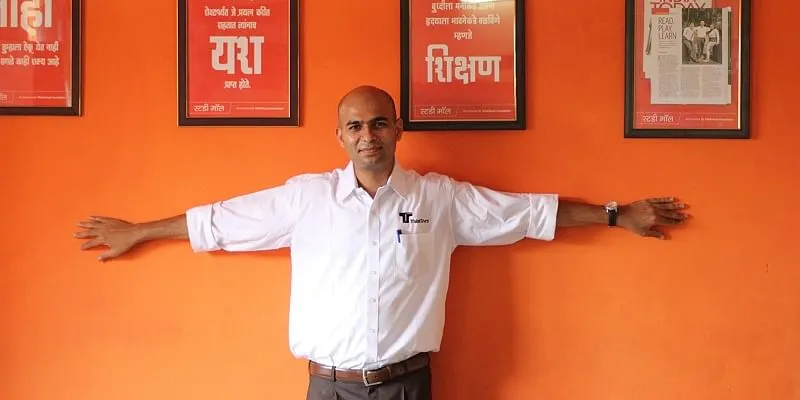
ThinkSharp co-founder Santhosh Phad
Mumbai-based ThinkSharp Foundation is a non-profit that is attempting to improve the quality of education in rural schools by providing access to infrastructure and digital devices.
The Gorhe-based teacher Rajnikanth has been engaging with them to bridge the accessibility gap.
“ThinkSharp Foundation provided us with 50 tablets to conduct our classes. To ensure that all the 160 students in the school benefit from it, we grouped them according to the localities in which they live and gave them one tablet each. During the online classes, five to six children form a group and use the device,” says Rajinikanth.
Talking about their initiative, ThinkSharp Foundation co-founder Santhosh Phad says, “We are constantly working to introduce the online education model in rural schools. We are setting up digital classrooms in the schools for both offline and online sessions. So far, we have set up digital classrooms in 51 rural schools across Maharashtra.”
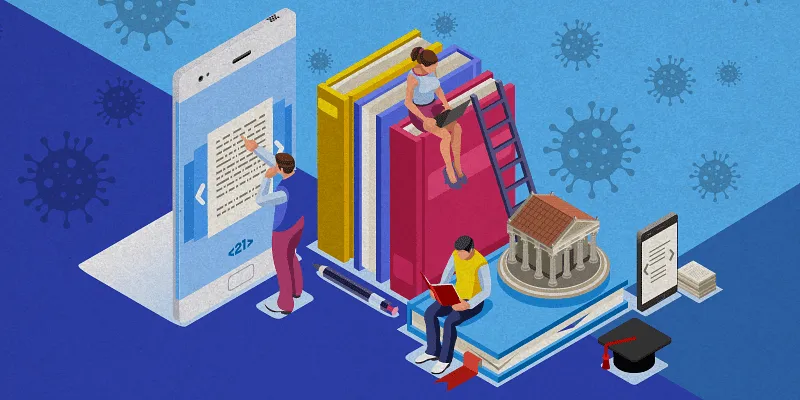
Another major issue is poor internet connectivity in remote areas.
Recently, BSNL launched the Bharat AirFibre network in Bihar, and the initiative is being seen as a stepping stone towards making 4G internet accessible in the most remote areas in the country. With the immense scope for digital education, the network aims to cover six lakh villages in 1,000 days.
While this project is still in the works, teachers like Rajinikanth are spending from their own pockets to recharge the data packs for students to attend classes.
The Ministry of Education has been working towards providing online learning access to rural students. Initiatives such as the National Repository of Open Educational Resources (NROER), DIKSHA learning app, e-Pathshala, Swayam Prabha, as well as various TV and radio channels are being leveraged for further inclusion.
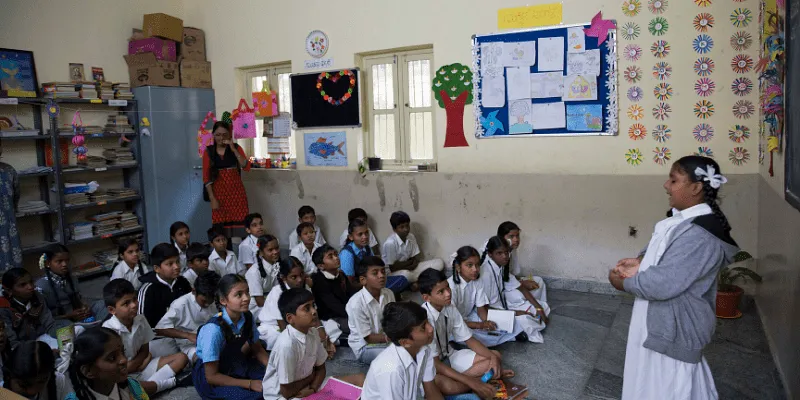
One of Makkala Jagriti's learning sessions in progress.
In addition to this, the Karnataka Department of Women and Child Development in partnership with the NGO Makkala Jagriti launched a ‘Learning at home initiative’ called ‘Manyelliye Oota Maneyalliye Paatha’ to reach out to all children through their parents’ WhatsApp groups.
“Under this initiative, daily activities are sent to parents’ WhatsApp groups through a short video demonstration on YouTube. Parents do the activities with the children and share it back on WhatsApp with the educator. These activities started by our NGO are simple and easy to use with locally available resources and are aligned with all aspects of development for early learning such as fine and gross motor, language, cognitive, socio-emotional, and creative learning,” says Makkala Jagriti founder Joy Srinivasan.
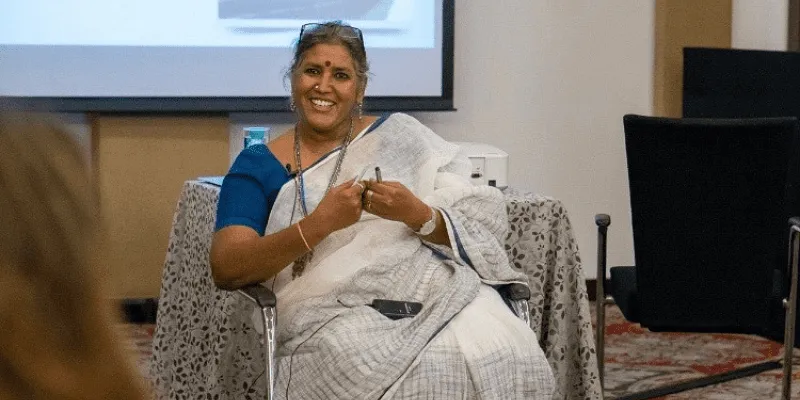
Makkala Jagriti founder Joy Srinivasan
While teachers are burning the candle at both ends to stay in line with the developments of the digital age, there is lack of awareness on using digital tools.
, a Mumbai-based edtech startup that is training students for competitive exams, has created an online course to assist teachers in this regard.
“At Testbook, we created a teaching course that has 30 hours of course content, which focusses on how to use the digital devices to conduct online classes. The course was launched about three weeks ago and has already gained traction with over 7,000 registrations,” says Testbook CEO and co-founder Ashutosh Kumar.
A future filled with hope
The plight of teachers has come to the fore ever since the pandemic started. However, some of the initiatives launched by startups and NGOs are accelerating the adoption of digital education in rural areas.
The government is also playing a significant role in aiding both teachers and students to embrace technology through its Digital India programme.
EduBridge, an industry leader in the field of employment-focussed vocational skill training, is running specialised ‘Train the Teacher’ schools called GuruSchool. The programme is looking to upskill teachers in semi-urban and rural India.
Edubridge CEO Girish Singhania says,
“At the heart of all the workforce development and vocational training lies the teacher or the guru – the learned, dedicated, selfless, and resilient human being who possesses knowledge and skills, and the power to bring change. Our teachers are the architects of tomorrow’s workforce and hence the country’s future.”
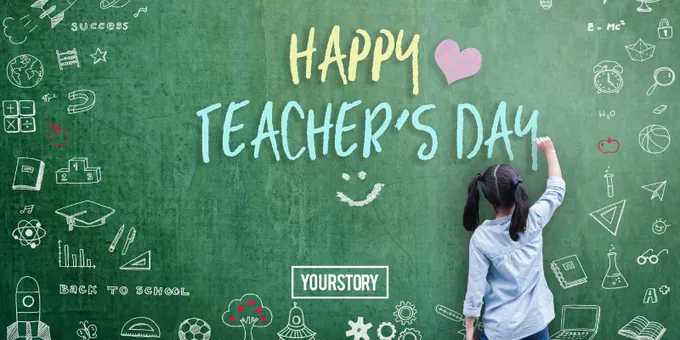
Even in the face of challenges posed by the pandemic, teachers have been stepping out of their comfort zones to extend their support to the students. Be it learning new skills, adapting to technological interventions, or finding alternatives to the traditional classrooms, they have time and again proved that no hurdle is too big for them.
So, here’s wishing all the teachers a Happy Teacher’s Day!
Edited by Javed Gaihlot


